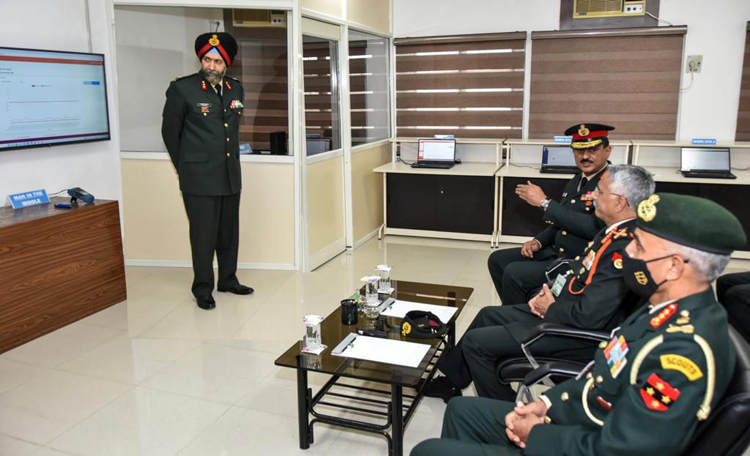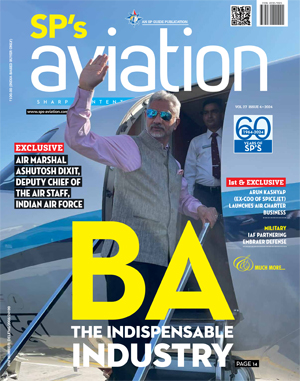INDIAN ARMED FORCES CHIEFS ON
OUR RELENTLESS AND FOCUSED PUBLISHING EFFORTS

SP Guide Publications puts forth a well compiled articulation of issues, pursuits and accomplishments of the Indian Army, over the years

I am confident that SP Guide Publications would continue to inform, inspire and influence.

My compliments to SP Guide Publications for informative and credible reportage on contemporary aerospace issues over the past six decades.
Quantum Communications for Armed Forces
Concrete steps are being taken for integrated and advanced secure communication solutions in the evolving landscape of modern warfare
 |
The Author is Former Director General of Information Systems and A Special Forces Veteran, Indian Army |

Russia and China have successfully tested a satellite based quantum communication to communicate over a distance of about 4,000 km, according to the media reports of January 12, 2024. The test was enabled by China's 'Mozi' satellite. The test involved transmitting a message from a ground-receiving station in China linked to a Russian facility nearly 4,000 km away. The test was conducted in 2023, as described in a paper in mid-December by Alexey Fedorov, who is part of Russia's National University of Science and Technology, the Russian Quantum Center (RQC).
According to RQC researchers, Moscow-based QSpace Technologies, and MISIS University, advanced supercomputers and quantum computing have allowed more avenues for information systems to be attacked but quantum communication, which uses cryptography to encode data in single photons, plugs this vulnerability since encrypted data is transferred into ones and zeros and decrypted with a 'quantum key'.
Russia and China have successfully tested a satellite-based quantum communication over a distance of about 4,000 km, using China's 'Mozi' satellite
According to a report in the South China Morning Post (SCMP), Russian and Chinese scientists sent two encoded images secured by 'quantum keys' at a distance of 3,800 km, between a ground station close to Moscow and another near Urumqi in China's western Xinjiang region. This confirms previous reports that Russia and China plan to share satellite intelligence and data as part of space cooperation.
Media reports indicate that on the sidelines of the Brazil-Russia-India-China (BRICS) meeting in July 2023, India was also invited to be part of this first Russia-China full cycle quantum communication test. India would have naturally not joined because of security concerns and the ongoing border standoff with China. The Russia-China quantum communication link is being viewed as a precursor to the Chinese-Russian effort towards an alternative financial, geo-economics, economic, technological, and commercial system in BRICS to the West.
The Russia-China quantum communication link is seen as a precursor to their joint efforts in developing an alternative system within BRICS
However, BRICS has already expanded and is expected to continue expanding. For BRICS to be linked through quantum communications the countries would first need to align their national telecommunications, IT, and data exchange laws, given the scientific, technical, and commercial potential attributes of the project.Besides, quantum communications networks also need other infrastructure like specialised satellites and ground control stations.
China's 'Mozi' satellite was launched in 2016 following which China has set up a series of ground receiving and control stations to conduct various experiments; opening up pathways to develop national and international quantum communication networks. In 2020, the Russian and Mozi teams set up a ground station with telescopes and cameras to track the satellite at the Zvenigorod observatory near Moscow. Various experiments were conducted between the Zvenigorod ground station and China's Nanshan ground station near Urumqi.


Concurrently, efforts are on in India also to explore provision of quantum communications for the Armed Forces. According to the media reports of January 12, 2024, the Chief of Defence Staff (CDS) General Anil Chauhan recently visited the Centre for Development of Telematics (C-DOT) Delhi Campus with the purpose of exploring collaboration between C-DOT and the Indian Armed Forces for the development of advanced and secure telecom solutions.
Efforts are underway in India to explore the provision of quantum communications for the Armed Forces
C-DOT gave a detailed presentation to the CDS covering theindigenously developed advanced security solutions and detailed overview of the Telecom product portfolio, including key areas like the security operation centre for real-time detection of network malware, enterprise security centre for detecting and mitigating threats at an enterprise level, Quantum Key Distribution, and Post Quantum Cryptography.The presentation also covered solutions such as 4G and 5G core and radio access networks, disaster management using Common Alert Protocol (CAP), optical transport and access solutions, and switching and routing solutions.
The C-DOT CEO Dr Rajkumar Upadhyay assured the CDS of C-DOT's commitment to developing state-of-the-art security solutions aligned with the needs of the Indian Armed Forces. In turn, the CDS emphasised the importance of collaboration between C-DOT and the three branches of the Indian Armed Forces, highlighting the need for integrated and advanced secure communication solutions in the evolving landscape of modern warfare, shifting from network-centric to data-centric approaches.
C-DOT showcased indigenously developed advanced security solutions, including Quantum Key Distribution
The visit of General Chauhan included lab demonstrations of various solutions, providing practical insights into their applications. Interacting with C-DOT engineers, the CDS expressed confidence in India's ability to protect its communication systems and cyberspace, acknowledging the transformative phase of digitisation in the country and C-DOT's efforts towards achieving this. He said, "Our country is in the midst of transformation, we are moving on the path of digitisation, all our actions are striving towards indigenization." He described his visit to C-DOT as a revelation and expressed confidence in the nation's ability to safeguard its communication systems and cyberspace.
On balance, while we have the capabilities, we need to move at a very fast pace considering the mounting threats to India. Security of communications in the battle space can make the difference between losing or winning the war.





